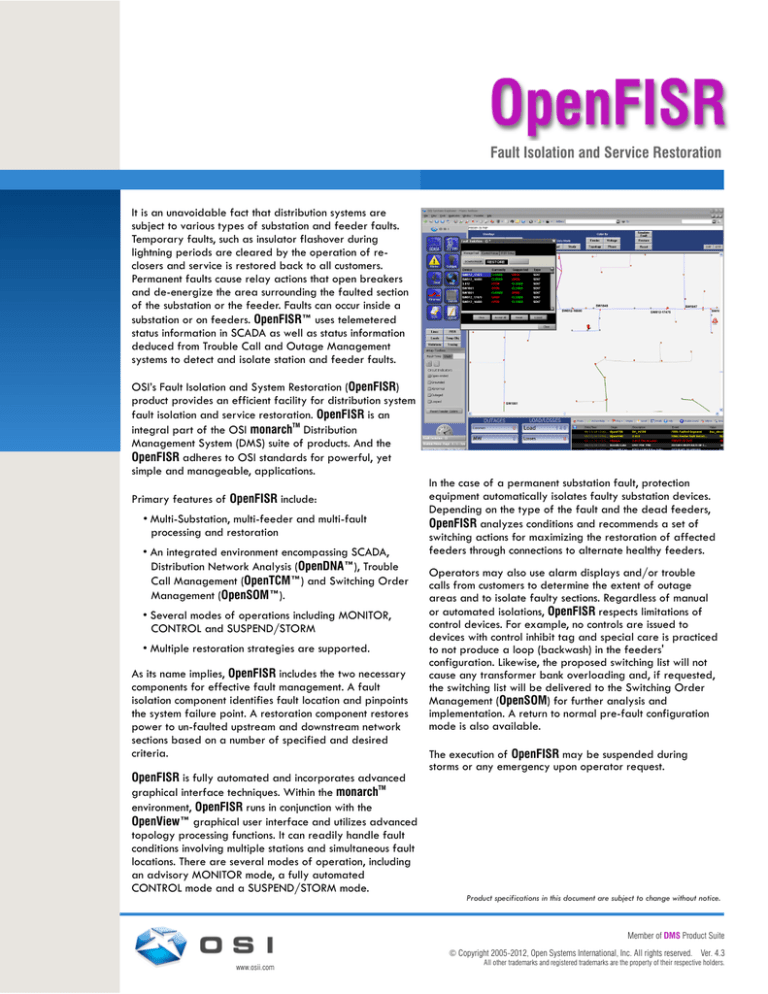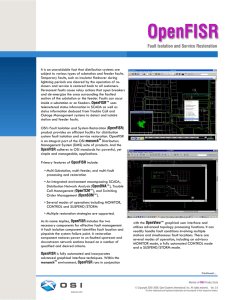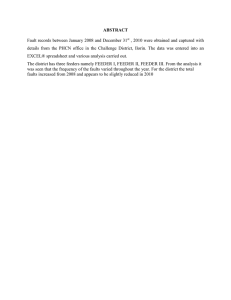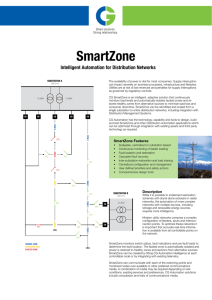
Fault Isolation and Service Restoration
It is an unavoidable fact that distribution systems are
subject to various types of substation and feeder faults.
Temporary faults, such as insulator flashover during
lightning periods are cleared by the operation of reclosers and service is restored back to all customers.
Permanent faults cause relay actions that open breakers
and de-energize the area surrounding the faulted section
of the substation or the feeder. Faults can occur inside a
substation or on feeders. OpenFISR™ uses telemetered
status information in SCADA as well as status information
deduced from Trouble Call and Outage Management
systems to detect and isolate station and feeder faults.
OSI’s Fault Isolation and System Restoration (OpenFISR)
product provides an efficient facility for distribution system
fault isolation and service restoration. OpenFISR is an
TM
integral part of the OSI monarch Distribution
Management System (DMS) suite of products. And the
OpenFISR adheres to OSI standards for powerful, yet
simple and manageable, applications.
Primary features of OpenFISR include:
• Multi-Substation, multi-feeder and multi-fault
processing and restoration
• An integrated environment encompassing SCADA,
Distribution Network Analysis (OpenDNA™), Trouble
Call Management (OpenTCM™) and Switching Order
Management (OpenSOM™).
• Several modes of operations including MONITOR,
CONTROL and SUSPEND/STORM
• Multiple restoration strategies are supported.
As its name implies, OpenFISR includes the two necessary
components for effective fault management. A fault
isolation component identifies fault location and pinpoints
the system failure point. A restoration component restores
power to un-faulted upstream and downstream network
sections based on a number of specified and desired
criteria.
OpenFISR is fully automated and incorporates advanced
TM
graphical interface techniques. Within the monarch
environment, OpenFISR runs in conjunction with the
OpenView™ graphical user interface and utilizes advanced
topology processing functions. It can readily handle fault
conditions involving multiple stations and simultaneous fault
locations. There are several modes of operation, including
an advisory MONITOR mode, a fully automated
CONTROL mode and a SUSPEND/STORM mode.
In the case of a permanent substation fault, protection
equipment automatically isolates faulty substation devices.
Depending on the type of the fault and the dead feeders,
OpenFISR analyzes conditions and recommends a set of
switching actions for maximizing the restoration of affected
feeders through connections to alternate healthy feeders.
Operators may also use alarm displays and/or trouble
calls from customers to determine the extent of outage
areas and to isolate faulty sections. Regardless of manual
or automated isolations, OpenFISR respects limitations of
control devices. For example, no controls are issued to
devices with control inhibit tag and special care is practiced
to not produce a loop (backwash) in the feeders'
configuration. Likewise, the proposed switching list will not
cause any transformer bank overloading and, if requested,
the switching list will be delivered to the Switching Order
Management (OpenSOM) for further analysis and
implementation. A return to normal pre-fault configuration
mode is also available.
The execution of OpenFISR may be suspended during
storms or any emergency upon operator request.
Product specifications in this document are subject to change without notice.
Member of DMS Product Suite
© Copyright 2005-2012, Open Systems International, Inc. All rights reserved. Ver. 4.3
www.osii.com
www.osii.com
All other trademarks and registered trademarks are the property of their respective holders.




